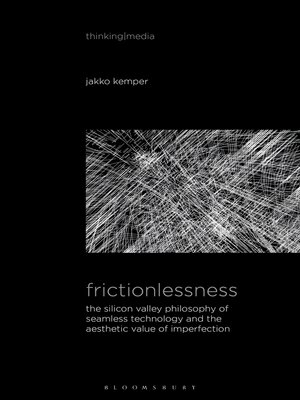Frictionlessness
ebook ∣ The Silicon Valley Philosophy of Seamless Technology and the Aesthetic Value of Imperfection · Thinking Media
By Jakko Kemper

Sign up to save your library
With an OverDrive account, you can save your favorite libraries for at-a-glance information about availability. Find out more about OverDrive accounts.
Find this title in Libby, the library reading app by OverDrive.



Search for a digital library with this title
Title found at these libraries:
| Library Name | Distance |
|---|---|
| Loading... |
Frictionlessness provides an examination of the environmentally destructive digital design philosophy of "frictionlessness" and the critical significance of a technological aesthetic of imperfection.
If there is one thing that defines digital consumer technologies today, it is that they are designed to feel frictionless. From smart technologies to cloud computing, from from one-click shopping to the promise of seamless streaming-digital technology is framed to host ever-faster operations while receding increasingly into the background of perception. The environmental costs of this fetishization of frictionlessness are enormous and unevenly distributed; the frictionless experience of the end user tends to be supported by opaque networks of exploited labor and extracted resources that disproportionately impact the Global South. This situation marks an urgent need for alternate, less destructive aesthetic relations to technology. As such, this book examines imperfection, as an aesthetic concept that highlights existential conditions of finitude and fragility, as a particularly powerful counterweight to the dominant digital design philosophy of frictionlessness.
While frictionlessness aims to draw the user's perception away from the exploitative and destructive conditions of digital production, imperfection forms an aesthetic source of friction that alerts users to the fragile nature of technology and the finite resources on which it relies. These arguments are elaborated through a close reading of three technological objects-a video game that was programmed to expire, an audiovisual performance that laments the fate of disused technology and a collection of music albums that dramatize a techno-cultural logic of relentless consumerism. Together, these case studies underline the value of technological aesthetics of imperfection and point to the need for a renewed ethics of care in relation to technology.
If there is one thing that defines digital consumer technologies today, it is that they are designed to feel frictionless. From smart technologies to cloud computing, from from one-click shopping to the promise of seamless streaming-digital technology is framed to host ever-faster operations while receding increasingly into the background of perception. The environmental costs of this fetishization of frictionlessness are enormous and unevenly distributed; the frictionless experience of the end user tends to be supported by opaque networks of exploited labor and extracted resources that disproportionately impact the Global South. This situation marks an urgent need for alternate, less destructive aesthetic relations to technology. As such, this book examines imperfection, as an aesthetic concept that highlights existential conditions of finitude and fragility, as a particularly powerful counterweight to the dominant digital design philosophy of frictionlessness.
While frictionlessness aims to draw the user's perception away from the exploitative and destructive conditions of digital production, imperfection forms an aesthetic source of friction that alerts users to the fragile nature of technology and the finite resources on which it relies. These arguments are elaborated through a close reading of three technological objects-a video game that was programmed to expire, an audiovisual performance that laments the fate of disused technology and a collection of music albums that dramatize a techno-cultural logic of relentless consumerism. Together, these case studies underline the value of technological aesthetics of imperfection and point to the need for a renewed ethics of care in relation to technology.







